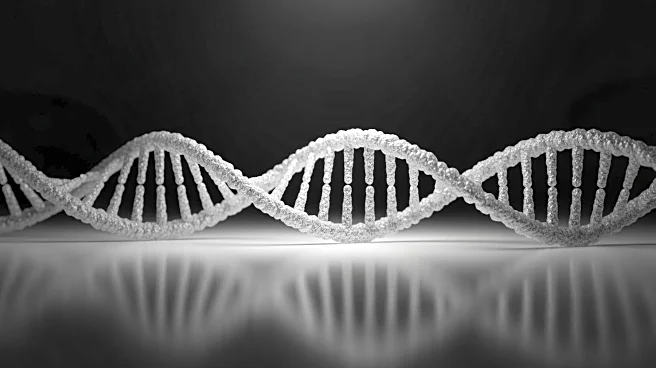What's Happening?
James Watson, a pivotal figure in the field of genetics, has passed away at the age of 97 in a New York hospice facility. Watson, alongside Francis Crick and Maurice Wilkins, was awarded the Nobel Prize
in Physiology or Medicine in 1962 for discovering the double helix structure of DNA. This groundbreaking discovery has been fundamental to advancements in biology, influencing the understanding of genetic information storage and the development of treatments for genetic diseases. Watson's career included significant roles at Cold Spring Harbor Laboratory in New York, where he served as director, president, and chancellor, transforming it into a leading institution in molecular biology. He also briefly led the Human Genome Project, resigning due to disagreements over gene patenting. Despite his scientific achievements, Watson's career was marred by controversies, including criticism for his comments on marginalized groups and the underacknowledgment of Rosalind Franklin's contributions to the DNA discovery.
Why It's Important?
James Watson's contributions to genetics have had a profound impact on scientific research and medical advancements. The discovery of DNA's double helix structure has been crucial in understanding hereditary information, paving the way for innovations in genetic research and biotechnology. Watson's leadership at Cold Spring Harbor Laboratory helped establish it as a premier research institution, fostering developments in molecular biology. However, his controversial remarks and the overshadowing of Rosalind Franklin's role in the DNA discovery highlight ongoing discussions about ethics and recognition in scientific research. Watson's legacy is a reminder of the complexities in balancing scientific achievement with personal conduct and acknowledgment of collaborative efforts.
What's Next?
The passing of James Watson may prompt renewed discussions on the ethical dimensions of scientific research and the importance of recognizing contributions from all involved parties. Institutions like Cold Spring Harbor Laboratory may reflect on Watson's legacy, potentially influencing future policies on diversity and inclusion in science. The scientific community might also revisit the historical narrative of the DNA discovery, ensuring that contributions from all researchers, including Rosalind Franklin, are adequately acknowledged. As genetics continues to evolve, Watson's work will remain foundational, influencing ongoing research and ethical considerations in the field.
Beyond the Headlines
James Watson's career underscores the ethical challenges in scientific research, particularly regarding recognition and the impact of personal conduct on professional legacy. The controversies surrounding his remarks and the acknowledgment of Rosalind Franklin's contributions highlight the need for inclusive and respectful scientific discourse. Watson's story serves as a case study in the importance of balancing groundbreaking scientific achievements with ethical responsibility and recognition of collaborative efforts. As the field of genetics advances, these discussions will continue to shape the narrative and practices within the scientific community.









